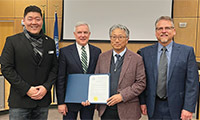Gay Conservatism and Straight Liberation
▶ Ross Douthat
This debate was tactical (since the cause once seemed quixotic) but also philosophical.
One current of thought saw the institution of marriage as inherently oppressive, patriarchal or heteronormative, better rejected or radically transformed than simply joined.
This liberationist perspective endured in academia, but mostly lost the political argument. Gay couples wanted the chance for normalcy, straight Americans were surprisingly receptive, and so a conservative case for same-sex marriage — the argument that marriage is essential to human equality and dignity — is flourishing.
And now that case rings from every paragraph of Anthony Kennedy’s marriage ruling, from the first lines to the “no union is more profound than marriage” peroration.
But in one of the ironies in which the arc of history specializes, while the conservative case for same-sex marriage triumphed in politics, the liberationist case against marriage’s centrality to human flourishing was winning in the wider culture.
You would not know this from Kennedy’s opinion, which is relentlessly upbeat about how “new insights have strengthened, not weakened” marriage, bringing “new dimensions of freedom” to society.
But the central “new dimension of freedom” being claimed by straight America is a freedom from marriage — from the institution as traditionally understood, and from wedlock and family, period.
The traditional understanding, which rested on sex difference, procreation, and real permanence, went into crisis in the 1960s and 1970s. But in the 1990s, when The Atlantic informed readers that “Dan Quayle Was Right” about unwed motherhood and today’s Democratic front-runner fretted about the costs of no-fault divorce, there were reasons to think that a kind of neo-traditionalism might still have purchase in America.
Not so today. Since the ‘90s, approval of divorce, premarital sex, and out-of-wedlock childbearing have climbed steadily, and the belief that children are “very important” to marriage has collapsed. Kennedy’s ruling argues that the right to marry is essential, in part, because the institution “safeguards children and families.” But the changing cultural attitudes that justify his jurisprudence increasingly treat this safeguard as inessential, a potentially nice but hardly necessary thing.
And the same is true of marriage itself. America is not quite so “advanced” as certain European societies, but our marriage rate is at historic lows, with the millennial generation, the vanguard of support for same-sex marriage, leading the retreat. Millennials may agree with Kennedy’s ruling, but they’re making his view of marriage as “a keystone of the nation’s social order” look antique. In their views and (lack of) vows, they’re taking a more relaxed perspective, in which wedlock is malleable and optional, one way among many to love, live, rear kids — or not.
In this sense, the gay rights movement has won twice over. Its conservative wing won the right to normalcy for gay couples, while rapid cultural change has made the definition of normalcy less binding than the gay left once feared.
In vain social conservatives have argued that this combination isn’t a coincidence, that support for same-sex marriage and the decline of straight marital norms exist in a kind of feedback loop, that an idea can have conservative consequences for one community and revolutionary implications overall.
This argument was ruled out, irrationally, as irrational, but it probably wouldn’t have mattered if the courts were willing to consider it. Too many Americans clearly just like the more relaxed view of marriage’s importance, and the fact that this relaxation makes room for our gay friends and neighbors is only part of its appeal. Straight America has its own reasons for seeking liberation from the old rules, its own hopes of joy and happiness to chase.
Unfortunately I see little evidence that people are actually happier in the emerging dispensation, or that their children are better off, or that the cause of social justice is well-served, or that declining marriage rates and thinning family trees (plus legal pressure on religious communities that are exceptions to this rule) promise anything save greater loneliness for the majority, and stagnation overall.
The case for same-sex marriage has been pressed in the name of the Future. But the vision of marriage and family that made its victory possible is deeply present-oriented, rejecting not only lessons of a long human past but also many of the moral claims that inspire adults to privilege the interests of their children, or indeed to bring children into existence at all.
Perhaps, with same-sex marriage an accomplished fact, there will be cultural space to consider these lessons and claims anew. Perhaps.
But seeing little such space, and little recognition that anything might have been lost along the road we’ve taken to this ruling, in the name of the past and the future I respectfully dissent.
스마터리빙
more [ 건강]
[ 건강]이제 혈관 건강도 챙기자!
[현대해운]우리 눈에 보이지 않기 때문에 혈관 건강을 챙기는 것은 결코 쉽지 않은데요. 여러분은 혈관 건강을 유지하기 위해 어떤 노력을 하시나요?
 [ 건강]
[ 건강]내 몸이 건강해지는 과일궁합
 [ 라이프]
[ 라이프]벌레야 물럿거라! 천연 해충제 만들기
 [ 건강]
[ 건강]혈압 낮추는데 좋은 식품
[현대해운]혈관 건강은 주로 노화가 진행되면서 지켜야 할 문제라고 인식되어 왔습니다. 최근 생활 패턴과 식생활의 변화로 혈관의 노화 진행이 빨라지고
사람·사람들
more
[한인단체 신년 인터뷰] LA 평통 장병우 회장… “본연 역할로 한반도 평화 실질 기여”
민주평화통일자문회의 LA협의회(이하 LA 평통) 장병우 회장은 6일 본보와의 신년 인터뷰에서 붉은 말의 해인 병오년 새해를 맞아 신년 화두로 …

워싱턴주에 첫 한인 시의장
워싱턴주에서 첫 한인 시의회 의장이 탄생했다. 제이슨 문(한국명 문태원) 머킬티오 시의원이 새해 들어 시의장으로 선출되며 또 하나의 중책을 맡…
국회 방문단 대한인국민회 방문
윤후덕·이해식·김한규 의원과 조오섭 국회의장 비서실장 등 10여 명의 한국 국회방문단이 지난 5일 LA를 찾아 로즈데일 묘지와 국민회관 등 미…
[한인단체 신년 인터뷰] 명원식 파바월드 회장… …
“한인 차세대들이 바르게 자랄 수 있는 토대를 만드는 것이 제가 파바월드의 회장으로 존재하는 유일한 이유입니다”한인사회의 대표적 청소년 봉사 …
LA한인회 멘토 프로그램 10일 스티브 강 위원장
LA 한인회(회장 로버트 안)가 한인사회 차세대 인재양성 노력의 하나로 ‘멘토를 만나다’ 프로그램을 정례화해 실시하고 있는 가운데 그 세 번째…
많이 본 기사
- ICE 요원 총격… 시민권자 여성 사… 2
- 초강경 이민단속, 아시아계도 큰 타격 2
- 이주자 텍사스 몰린다 가주는 유입자 최하위
- 케빈 김 주한 미 대사대리 전격 이임
- 가주 등 5개주 연방 아동보육 예산 전격 동결
- 42억 횡령→징역형 집유 받았는데도..황정음 소속사 여전히 미등록
- ‘故안재환과 사별’ 정선희, 재혼 질문에 솔직 답변 “국내에선 의향 없어”
- 팰팍 타운 77만달러 적자 놓고 정치권‘충돌’
- “주택 부족, 워싱턴 경제 위험 초래”
- D-SNP 한인 가입자들, 그로서리 혜택 놓친다
- ‘연방 하원 민주·상원 공화’가능성 커
- 애난데일서 뺑소니 사고 보행자 중태…제보 기다려
- 경관이 항공기내 성추행 LA행서 신체노출 ‘유죄’
- “게이더스버그 지부 10일 개소해요”
- “새해에는 영어 마스터합시다”
- 41세 구혜선, 석사 논문 합격→조기졸업.. “다음은 박사 필승!”
- 치매 예방효과 탁월한 활동은 ‘춤’…… 1
- LAX 무인열차 6월엔 개통되나
- 尹 ‘내란 우두머리’ 재판 내일 종료…사형? 무기징역? 구형 주목
- ‘맥립’에 갈비고기 없다 맥도널드 허위광고 소송
- 뉴욕 등 5개주 연방아동보육예산 지원 전격 중단
- 한인 제이슨 문, 머킬티오 시의장됐다...5일 첫 회의 주재한 가운데 ‘한인의 날’지지 선언문 채택
- 형제교회 올해도 1만달러 ...꿈나눔북클럽 2,000달러, 시애틀진보연대 500달러
- 트럼프, 각세우던 콜롬비아 대통령과 돌연 통화…백악관 초청도
- ‘범죄 제국’ 세운 프린스그룹 천즈…10대부터 PC방서 사이버범죄
- 故안성기, 9일(한국시간) 영결식..영정 정우성→설경구·주지훈 운구
- [독자 투고] 땅 끝 마을 파타고니아… 1
- 목·어깨·팔이 갑자기 찌릿하다면?… ‘근막동통증후군’ 일수도
- 부고-박철환 씨 별세
- “그린란드에 미군 동원 가능”… 트럼프 야욕 드러내
- 니콜 키드먼, 키스 어번과 공식 이혼
- 안정적 장학사업 체계 구축
- 은퇴준비를 더 이상 미루면 안되는 이유
- “마두로 체포 환영하는 시민 잡아라”…휴대폰 뒤지고 불심검문도
- [신년 집중기획/ 변모하는 한인타운] K-컬처 중심으로… 면모·체질 ‘업그레이드’ 원년
- 오렌지 상자와 함께하는 2026년
- 아펜젤러 한국선교 140주년 기념 미주 순회공연
- 제5대 회장에 김길영 회장 연임
- 존 하바 감독과 18년만에 결별
- 연말연시 음주운전 단속 379명 체포
- 사면된 의회 폭동범들 ‘적반하장’… 금전보상 요구까지
- 아시아나항공, 14일부터 인천공항 제2터미널 사용
- ‘기빙트리’ 캠페인서 총 1만7천달러 조성
- 美, ‘베네수와 연계’ 러 유조선 나포…미러 신경전 조짐
- 베네수 임시대통령, 美의 석유 관여 옹호… “모두에 이익되게”
- 2026년은?
- 투자·고정 지수 연금 어디에 맡길까?(2)
- 눈 내린 정경
- MD 몽고메리서 음주운전자 140여명 적발
- ‘스프링클스 컵케이크’… 전 매장 폐점
1/5지식톡

-
 미 육군 사관학교 West Poin…
0
미 육군 사관학교 West Poin…
0https://youtu.be/SxD8cEhNV6Q연락처:wpkapca@gmail.comJohn Choi: 714-716-6414West Point 합격증을 받으셨나요?미 육군사관학교 West Point 학부모 모…
-
 ☝️해외에서도 가능한 한국어 선생님…
0
☝️해외에서도 가능한 한국어 선생님…
0이 영상 하나면 충분합니다!♥️상담신청문의♥️☝️ 문의 폭주로 '선착순 상담'만 진행합니다.☎️ : 02-6213-9094✨카카오톡ID : @GOODEDU77 (@골뱅이 꼭 붙여주셔야합니다…
-
 테슬라 자동차 시트커버 장착
0
테슬라 자동차 시트커버 장착
0테슬라 시트커버, 사놓고 아직 못 씌우셨죠?장착이 생각보다 쉽지 않습니다.20년 경력 전문가에게 맡기세요 — 깔끔하고 딱 맞게 장착해드립니다!장착비용:앞좌석: $40뒷좌석: $60앞·뒷좌석 …
-
 식당용 부탄가스
0
식당용 부탄가스
0식당용 부탄가스 홀세일 합니다 로스앤젤레스 다운타운 픽업 가능 안녕 하세요?강아지 & 고양이 모든 애완동물 / 반려동물 식품 & 모든 애완동물/반려동물 관련 제품들 전문적으로 홀세일/취급하는 회사 입니다 100% …
-
 ACSL 국제 컴퓨터 과학 대회, …
0
ACSL 국제 컴퓨터 과학 대회, …
0웹사이트 : www.eduspot.co.kr 카카오톡 상담하기 : https://pf.kakao.com/_BEQWxb블로그 : https://blog.naver.com/eduspotmain안녕하세요, 에듀스팟입니다…
케이타운 1번가
오피니언
 이상희 UC 리버사이드 교수 인류학
이상희 UC 리버사이드 교수 인류학 오렌지 상자와 함께하는 2026년
 오세정 서울대 물리천문학부 명예교수·전 총장
오세정 서울대 물리천문학부 명예교수·전 총장 [오세정 칼럼] 병오년 새해, 한국의 과제
 존 안 / LA 거주
존 안 / LA 거주 [독자 투고] 땅 끝 마을 파타고니아 여행 유감
 이리나 수필가
이리나 수필가 [윌셔에서] 레디 코어(Ready Core)의 해를 맞으며
 이영창 / 한국일보 논설위원
이영창 / 한국일보 논설위원 [지평선] 67년생 현역 축구선수 미우라

[왈가 왈부] “이혜훈 청문회까지 지켜봐야”… 국민 눈높이에 맞나요
 정숙희 논설위원
정숙희 논설위원케네디에 관한 네 개의 이야기
 마크 A. 시쎈 / 워싱턴포스트 칼럼니스트
마크 A. 시쎈 / 워싱턴포스트 칼럼니스트 [마크 A. 시쎈 칼럼] 트럼프의 20가지 업적
 김동찬 시민참여센터 대표
김동찬 시민참여센터 대표 [미국은 지금] 2026년 ‘손님’ 의식 버리고 ‘주인’ 입장을
1/3지사별 뉴스

팰팍 타운 77만달러 적자 놓고 정치권‘충돌’
뉴저지 팰리세이즈팍 타운정부가 지난해 77만5,000달러 재정적자가 발생한 것을 두고 정치권이 강하게 충돌하면서 지역 한인사회가 술렁이고 있다…
뉴욕 등 5개주 연방아동보육예산 지원 전격 중단

‘연방 하원 민주·상원 공화’가능성 커
올해 11월3일 미 전역에서 중간선거가 실시된다. 이번 선거에서는 연방 하원 전체 435석과 함께 연방 상원 100석 가운데 35석을 새로 선…
“주택 부족, 워싱턴 경제 위험 초래”

베네수 이어 그린란드…트럼프, 2년차 벽두부터 美우선주의 거친 질주
2026년 새해 벽두부터 도널드 트럼프 대통령의 행보가 심상치 않다.집권 2기 2년차를 맞아 자신과 지지층의 이념이라 할 ‘미국 우선주의’ 구…
중부 캘리포니아 ‘한인 이민사’ 나왔다

오늘 하루 이 창 열지 않음 닫기 


















































.png)


댓글 안에 당신의 성숙함도 담아 주세요.
'오늘의 한마디'는 기사에 대하여 자신의 생각을 말하고 남의 생각을 들으며 서로 다양한 의견을 나누는 공간입니다. 그러나 간혹 불건전한 내용을 올리시는 분들이 계셔서 건전한 인터넷문화 정착을 위해 아래와 같은 운영원칙을 적용합니다.
자체 모니터링을 통해 아래에 해당하는 내용이 포함된 댓글이 발견되면 예고없이 삭제 조치를 하겠습니다.
불건전한 댓글을 올리거나, 이름에 비속어 및 상대방의 불쾌감을 주는 단어를 사용, 유명인 또는 특정 일반인을 사칭하는 경우 이용에 대한 차단 제재를 받을 수 있습니다. 차단될 경우, 일주일간 댓글을 달수 없게 됩니다.
명예훼손, 개인정보 유출, 욕설 등 법률에 위반되는 댓글은 관계 법령에 의거 민형사상 처벌을 받을 수 있으니 이용에 주의를 부탁드립니다.
Close
x